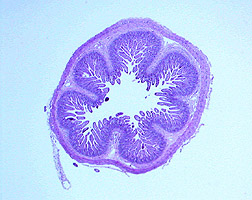This page has been archived and is being provided for reference purposes only. The page is no longer being updated, and therefore, links on the page may be invalid.
|
Read: about the research in Agricultural Research. |
Feeding Preemies for Optimal DevelopmentBy Jesús GarcíaJune 13, 2001 Agricultural Research Service scientists at the Children’s Nutrition Research Center in Houston, Texas, led by Douglas G. Burrin, have found that certain nutrients stimulate intestinal growth and maintain the mucous lining in neonatal, or prematurely born, animals. Their research suggests that the right amount of enteral feeding--feeding by mouth--may also benefit premature human infants. Preemies suffer from a variety of gastrointestinal complications that prevent doctors from feeding them in a normal fashion. They often have to depend on parenteral nutrition--that is, tube feeding that bypasses the intestinal tract--for their survival. Total parenteral nutrition (TPN) allows doctors to meet a premature infant’s nutritional requirements for growth and development when the infant’s size or condition precludes enteral feeding. ARS scientists are now trying to determine just how much enteral feeding is needed to optimize intestinal development. Researchers used neonatal piglets--whose gastrointestinal development and function, body composition and metabolism are similar to those of human neonatal infants--to quantify the minimal amounts of enteral nutrition necessary to stimulate and normalize growth of small intestines in preemies. They found that the minimum amount of enteral nutrients needed is 40 percent, and that 60 percent or more is needed to normalize intestinal growth, as opposed to the 5 to 10 percent previously used. The researchers are also using this approach to determine whether specific nutrients can be fed enterally to maximally stimulate intestinal growth and functional development. An article describing this research in greater detail appears in the June issue of Agricultural Research, ARS’ monthly magazine. ARS is the U.S. Department of Agriculture’s chief scientific research agency. Scientific contact: Douglas G. Burrin, ARS Children’s Nutrition Research Center, Baylor College of Medicine, Houston, Texas, phone (713) 798-7053, fax (713) 798-7057, dburrin@bcm.tmc.edu. |

